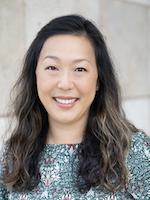Moving Towards Digital Equity in Preservice Coursework and Clinical Practice
,
Colorado Convention Center, 108/10/12
Presentations with similar research topics are each assigned to round tables where hour-long discussions take place. Roundtables are intended to be more collaborative discussions about research.
This is presentation 4 of 6, scroll down to see more details.
Other presentations in this group:
- Presentation 1: A Crisis of Academic Motivation in Undergraduate Students
- Presentation 2: Implementing the Iceberg Framework: Teaching Critical Evaluation of New Classroom Technologies
- Presentation 3: Increasing Transfer of Learning in Teacher Education Through Mixed Reality Simulations
- Presentation 5: The Impact of Soft-Deadlines on the Autonomous Learning of Online Students
- Presentation 6: Using Mixed Reality Simulation in Teacher Education
Presenters




Session description
Framework
Within our College of Education (COE) teacher credential programs, preservice teachers engage in clinical experiences to prepare for their role as future educators. During those experiences, they are supported and evaluated by clinical supervisors who utilize state-level Teaching Performance Expectations (TPEs) to guide their work and help prepare our preservice teachers for their future role. These TPEs are external standards provided by the state.
During Phase 1 of our research (and during ISTE’s 2023 research presentation) we shared how our work has identified a significant need for refining and innovating evaluation criteria to move beyond meeting standards and ensure that we are building our program in response to the assets and needs of our candidates and local school communities. This improvement and revision work directly aligns with the call from ISTE and the U.S. DOE’s Digital Equity and Transformation pledge. In short, our continuing research efforts seek to address ongoing programmatic gaps between preservice coursework and preparation, clinical practice supervision, and expectations of local school districts and administrators, particularly around classroom technology expectations and integration.
This work is situated within larger research-practice partnerships (RPP) that currently exists between the university and the local schools and districts we support (e.g., Coburn & Penuel, 2016). In general, RPPs are “long-term collaborations between practitioners and researchers that are organized to investigate problems of practice and solutions for improving schools and school districts” (Coburn & Penuel, 2016, p. 48). We are working with local administrators and mentor teachers to collaboratively co-construct and define subdomains and assessment strategies for preservice clinical practice experiences based on the specific needs, contexts, expectations, and cultures of the schools we serve. This work builds on existing partnerships with local districts, including the enrollment of many local administrators in our Administrative Services Credential program.
In addition to this larger RPP context, this work is situated within the specific context of our university being a Hispanic-Serving Institution (HSI). Seventy percent of our COE students are Hispanic/Latinx. However, being an HSI is more than demographics, and requires specific and unique types of support, programming, leadership, and policy to truly act in service of our students (Ballysingh et al., 2017). As such, we are continually moving towards enacting and revising policies and practices that align with measures (e.g., enrollment numbers, persistence numbers, university culture, feelings of belonging) that act in service of Hispanic/Latinx students (Ballysingh et al., 2017; Garcia, 2020). For example, we build connections and opportunities throughout our course curricula for students of color to draw on their own funds of knowledge and experiential wisdom (e.g., Gonzalez et al., 1995). This overarching philosophy of rejecting historical, white ideals and systems permeates the work we do, and serves as a guidepost and anchor for the activities addressed in this proposal.
We also aim to examine and assess the successful integration of technology through the incorporation of various frameworks, such as the Technological Pedagogical Content Knowledge (TPACK) framework (Mishra & Koehler, 2006), the Substitution, Augmentation, Modification, Redefinition (SAMR) framework (Hamilton et al., 2016), and emerging, more critically- and equity-oriented frameworks that have the potential to better address and serve our specific students (e.g., Heath et al., 2023). Approaches that account for and center cultural contexts and ways of knowing strongly align with our COE’s equity-focused lens while also ensuring that the subdomains, rubrics, and professional development we design are highly connected to the specific needs of our local schools.
Methods
The study focuses on the Educator Preparation Program (EPP) in a College of Education at a minority serving university in southern California that supports local partner districts, including Los Angeles Unified School District (LAUSD), the nation’s second largest district, and Inglewood Unified School District (IUSD). The EPP’s focus is to prepare critical-minded educators who co-create transformative change in classrooms. Edtech skill development is not currently a central focus of the EPP and no edtech courses are offered. We are employing a mixed-method approach (Creswell & Clark, 2017) across a two-phase study to address the study’s two research questions, as described below:
Phase 1 (Previously Reported On): What education technology integration occurs in partner pK-12 classrooms, and what knowledge and skills are expected of incoming teachers?
During Phase 1 of our research we conducted surveys with local administrators. Data were thematically analyzed (Braun & Clarke, 2006; Glaser & Strauss, 1999). Results from ISTE 2023 are summarized below in the results section.
Phase 2 (Current Work): How might we align approaches to education technology integration between Educator Preparation Programs (EPPs) and partner pK-12 school districts, while centering equity and still being mindful of teacher workload?
During Phase 2 of our research (ongoing) we are conducting surveys with preservice teachers, interviews with local administrators, finalizing the revision of our clinical practice domains assessment tools to more intentionally incorporate equitable education technology integration, pilot testing those new domains with Inglewood Unified School District (IUSD), and building a Teaching with Technology Lab (TTL) in our COE to support universal student and faculty access to education technology. Data collection and analysis around each of these areas is outlined below:
Preservice Teacher Surveys: We have currently surveyed 51 of our credential-seeking preservice teachers to better understand their practices and experiences with education technology integration in the COE. Prior to the ISTE 2024 (June 2024) we plan to survey an additional 50 to continue to gain a better understanding of their needs, experiences, and practices related to education technology integration. Survey data is being thematically analyzed (Braun & Clarke, 2006; Glaser & Strauss, 1999).
Administrator Interviews: As a follow-up to our ISTE 2023 presentation, we have expanded on our local administrator survey results with additional semi-structured interviews. Currently three administrators have been interviewed, with six additional administrators being scheduled. Interviews are being recorded, transcribed, and thematically analyzed (Braun & Clarke, 2006; Glaser & Strauss, 1999).
Clinical Practice Domain Revisions: Our domains of clinical practice have been revised to incorporate education technology integration. With the incorporation of education technology as 1 of 6 integral domains, we are now focusing on developing tools to assess preservice teachers’ classroom practice around each domain. Leveraging our deep partnerships with IUSD and LAUSD through state teacher residency capacity grants, we have opportunities to co-construct additional piloting and training of mentor teachers and clinical supervisors to ensure education technology is not only being incorporated, but being done so in equitable and accessible ways. The revised domains will be reported on during the presentation.
Pilot Testing with Inglewood Unified School District (IUSD): As these clinical domains are being defined, we are also pilot testing this work with partners in IUSD. We are building module-based training sessions for mentor teachers which will be delivered in Summer 2024. Descriptive results from that initial pilot-testing will be shared during the presentation.
Construction of a Teaching with Technology Lab (TTL): Finally, we are in the process of constructing a TTL for students and faculty to have universal access to technology to use in their coursework and field placements (e.g., laptops, ipads, etc.). We have been provided space within the COE and funding has been secured for the creation of this lab which will be staffed by undergraduate and/or graduate student assistants. Initial observations from the first semester of operation of the lab (Spring 2024) will be shared during the presentation.
Results
Phase 1 Results (Reported During ISTE 2023)
As reported during ISTE 2023, our Phase 1 results centered around understanding administrators’ expectations for incoming preservice teachers, specifically around education technology integration practices and experiences. Overall, administrators had general knowledge and skill expectations (e.g., be familiar with Google Suite, Microsoft Suite, technology integration models, etc.) as well as expectations for continued growth and professional development. Administrators also noted the importance of using technology to increase student engagement and student achievement. Within administrator survey results we also found an absence of equity-minded and critically-oriented perspectives around education technology. In other words, there was a universal expectation for teachers to integrate technology, but there was a lack of focus on ideas of how education technology might increase teacher labor demands, increase student surveillance, de-skill teachers, and other more equity- and critically-oriented ideas. The majority of administrators surveyed (70%) disagree or strongly disagree that integrating classroom technology was an added burden on teachers, and there were consistent expectations shared that incoming teachers should be able to meet these expectations.
Phase 2 Expected Results (Ongoing)
We currently have multiple, ongoing data collection and analysis pieces occurring. As described above, we are in the process of conducting interviews with local administrators who completed our phase survey. To date, nine administrators have agreed to participate and three have completed interviews. Initial results from thematic analysis indicate the need for school leaders to better understand, define, and familiarize themselves with more equity-focused education technology ideas and practices (e.g., how students’ data is being sold to third-party vendors, how students are being surveilled by technology outside of the classroom, etc.).
We have also conducted surveys with our preservice teachers and currently have 51 respondents, with another 50 expected prior to ISTE 2024. Initial results from thematic analysis indicate a strong misalignment with administrator perspectives. For example, only 14% of preservice teachers said they had enough time and/or support to be successful with learning and integrating education technology. Additionally, 92% had explicit recommendations for improving technology integration practices within our COE.
Finally, the initial revision of the clinical practice domain has been completed. Through an internally funded proposal, Teacher Education Division faculty and clinical coordinators engaged in conversations around the technology focused TPEs, and realized that these TPEs had become integrated “out” of clinical practice assessment. In a sense, they were integrated to a point of no longer being addressed or discussed. As a result, we constructed Domain 5, which is dedicated to promoting meaningful technology use and media literacy from an interdisciplinary lens. The ISTE standards sit within this domain, and while all the domains overlap, Domain 5 and Domain 4, focused on facilitating authentic, responsive learning experiences, are particularly interconnected. Our work with local districts will inform how these domains are assessed during clinical practice, and how coursework introduces these domains to our preservice teachers.
As of the time of submission of this proposal, data collection for the other data sources has either just begun, or will begin in the Spring 2024 semester (creation of the Teaching with Technology Lab and Pilot Testing with Inglewood Unified School District). These data collection processes are scheduled and have hard deadlines, and results will be available for reporting during ISTE 2024 if accepted.
Importance
The central, overarching goal of this ongoing research work is to balance tensions between preservice coursework and district expectations, while aligning that coursework with our equity- and justice-oriented COE mission and mission. We aim to provide a deep, nuanced exploration of how our preservice teacher program is engaging with this tension while simultaneously being mindful of teacher workload.
Given that technology use in schools has become an essential part of teaching and learning, EPPs must equip preservice teachers with the knowledge and skills needed to use technology in their classrooms in ways that are mindful and intentional, particularly given technology’s impact on underserved communities. This work is situated within a COE that forefronts the development of critically minded educators who challenge the ways schools (and technology) perpetuate systems of inequity. While understanding the needs and expectations of local administrators around effective technology integration within their schools is important and foundational work, tensions also exist around competing perspectives of the role edtech should play in the classroom.
Overall, this research aims to better understand the complex, intersecting, and often conflicting demands on preservice teachers, particularly around technology integration. By exploring these tensions and working to find balance between these varied perspectives, we seek to inform emerging models and frameworks for how technology integration experiences and practices can be enacted in more equitable ways.
References
Ballysingh, T. A., Zerquera, D. D., Turner, C. S., & Sáenz, V. B. (2017). Answering the call: Hispanic-serving institutions as leaders in the quest for access, excellence, and equity in American higher education. Association of Mexican American Educators Journal, 11(3), 6-28.
Braun, V., & Clarke, V. (2006). Using thematic analysis in psychology. Qualitative research in psychology, 3(2), 77-101.
Carspecken, F. P. (2013). Critical ethnography in educational research: A theoretical and practical guide. Routledge.
Coburn, C. E., & Penuel, W. R. (2016). Research–Practice Partnerships in Education: Outcomes, Dynamics, and Open Questions. Educational Researcher, 45(1), 48–54. https://doi.org/10.3102/0013189X16631750
Creswell, J. W., & Plano Clark, V. L. (2017). Designing and conducting mixed methods research (3rd ed.). SAGE Publications.
Dillman, D. A., Smyth, J. D., & Christian, L. M. (2014). Internet, phone, mail, and mixed-mode surveys: The tailored design method. John Wiley & Sons.
Fram, S. M. (2013). The constant comparative analysis method outside of grounded theory. Qualitative Report, 18, 1.
Garcia, G. A. (2020). Hispanic Serving Institutions (HSIs) in Practice: Defining “Servingness” at HSIs. Charlotte, NC: Information Age Publishing.
Glaser, A. & Strauss, A. (1999). The Discovery of grounded theory: Strategies for qualitative research (2nd Ed.). New York, NY: Transaction Publishers.
Gonzalez, N., Moll, L. C., Tenery, M. F., Rivera, A., Rendon, P., Gonzales, R., & Amanti, C. (1995). Funds of knowledge for teaching in Latino households. Urban Education, 29(4), 443-470.
Heath, M. K., Gleason, B., Mehta, R., & Hall, T. (2023). More than knowing: toward collective, critical, and ecological approaches in educational technology research. Educational technology research and development, 1-23. doi: 10.1007/s11423-023-10242-z
Hamilton, E. R., Rosenberg, J. M., & Akcaoglu, M. (2016). The substitution augmentation modification redefinition (SAMR) model: A critical review and suggestions for its use. TechTrends, 60, 433-441. doi: 10.1007/s11528-016-0091-y
Koehler, M. J., Mishra, P., Kereluik, K., Shin, T. S., & Graham, C. R. (2014). The technological pedagogical content knowledge framework. In Handbook of research on educational communications and technology (pp. 101-111). Springer, New York, NY.
Mishra, P., & Koehler, M. J. (2006). Technological pedagogical content knowledge: A framework for teacher knowledge. Teachers college record, 108(6), 1017-1054.
Pole, C., & Morrison, M. (2003). Ethnography for education. McGraw-Hill Education (UK).
Warr, M., Mishra, P., & Scragg, B. (2019, March). Beyond TPACK: Expanding technology and teacher education to systems and culture. In Society for Information Technology &
Teacher Education International Conference (pp. 2558-2562). Association for the
Advancement of Computing in Education (AACE).
Session specifications
Learner
- Set professional learning goals to explore and apply pedagogical approaches made possible by technology and reflect on their effectiveness.
- Advocate for equitable access to educational technology, digital content and learning opportunities to meet the diverse needs of all students.
 Return
Return Listen and learn: Research paper
Listen and learn: Research paper  Trips and Tours
Trips and Tours